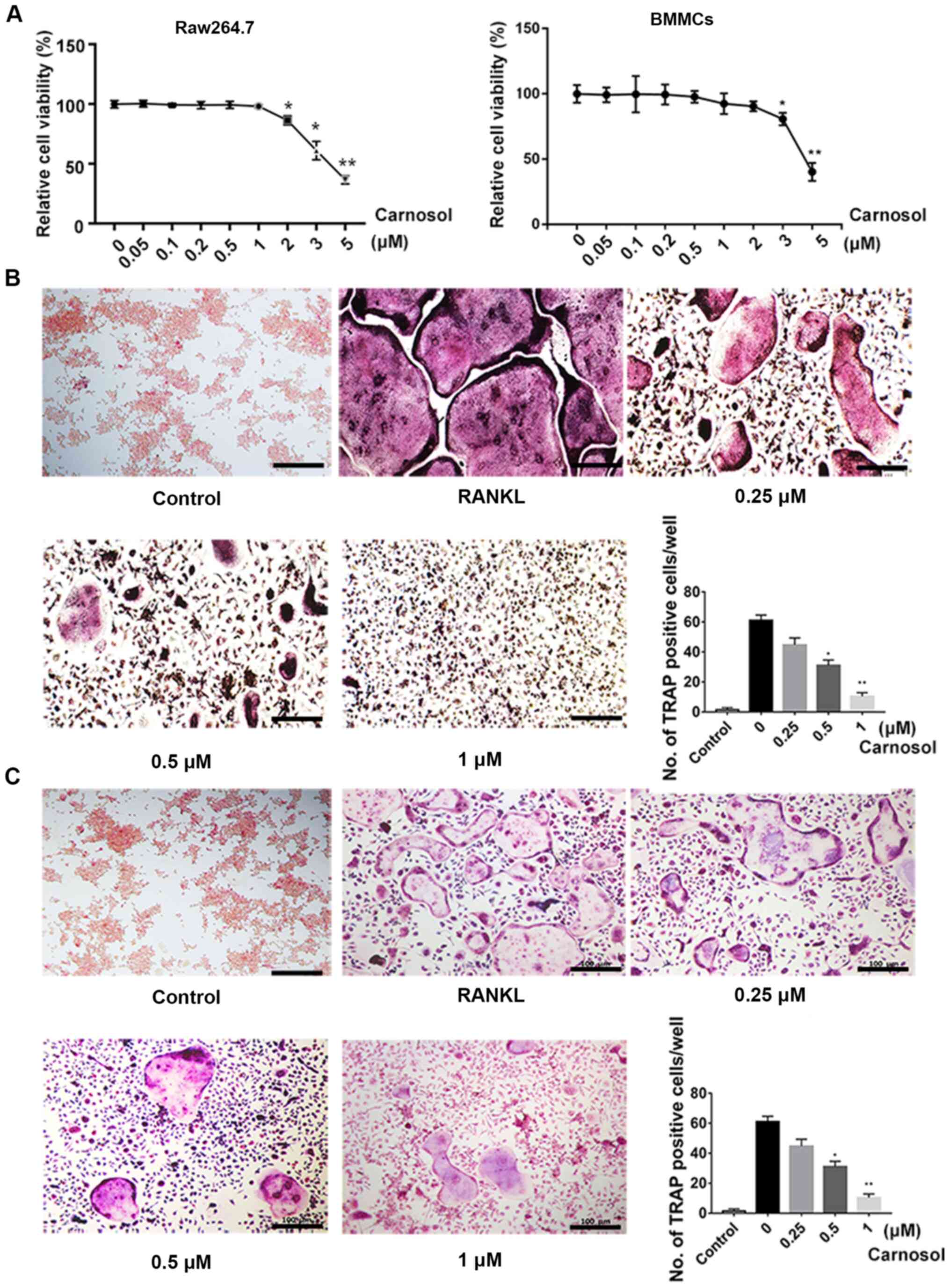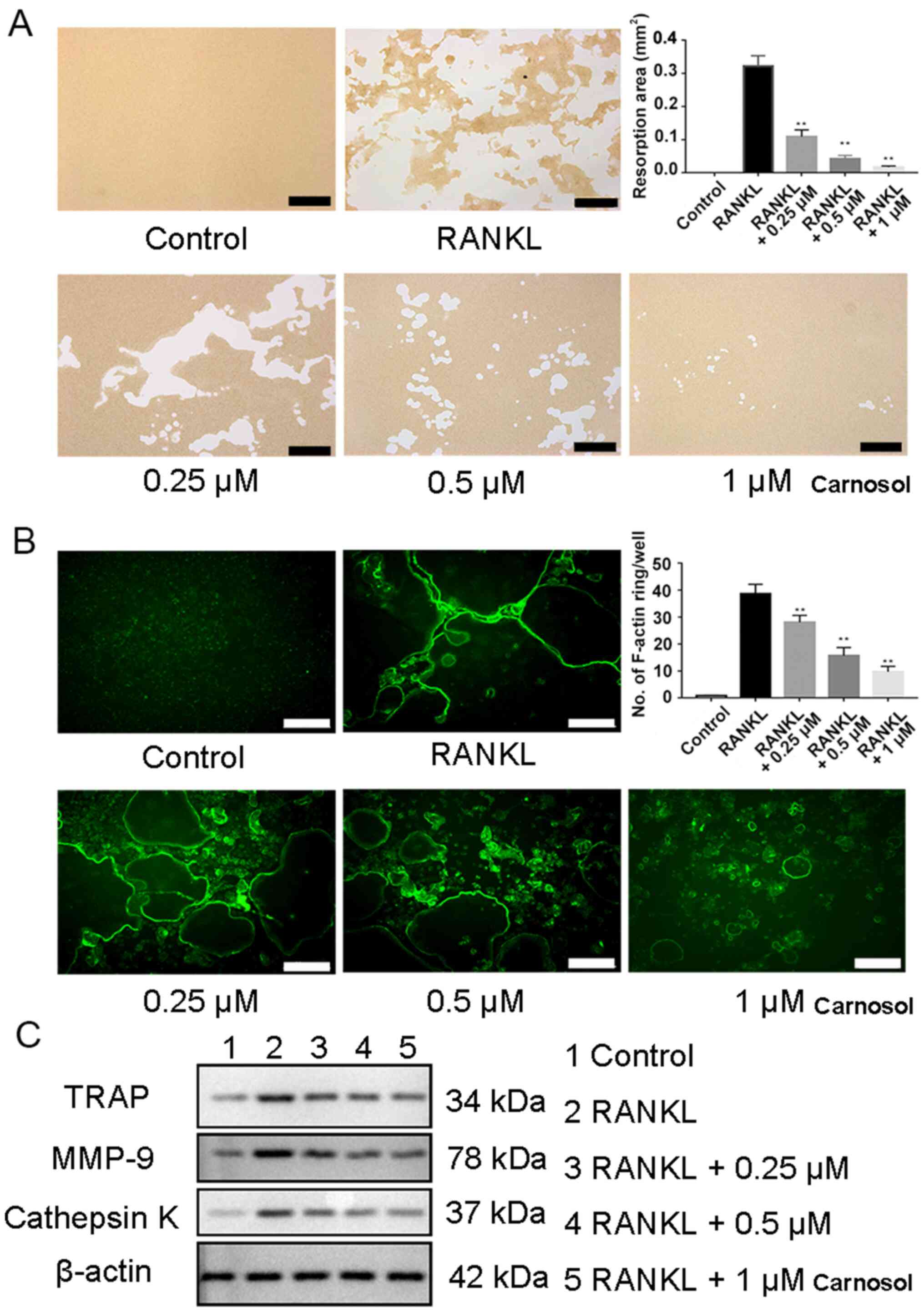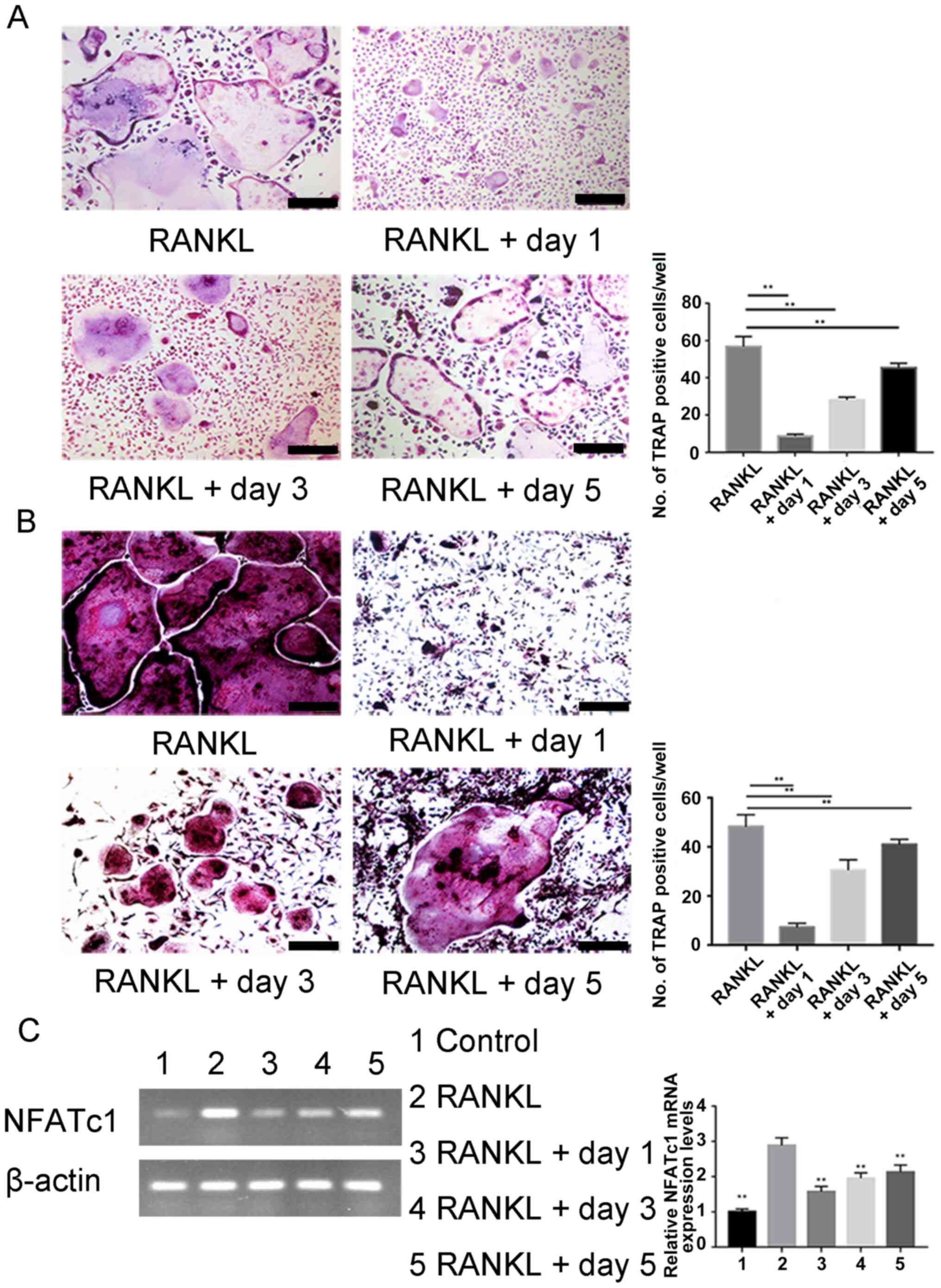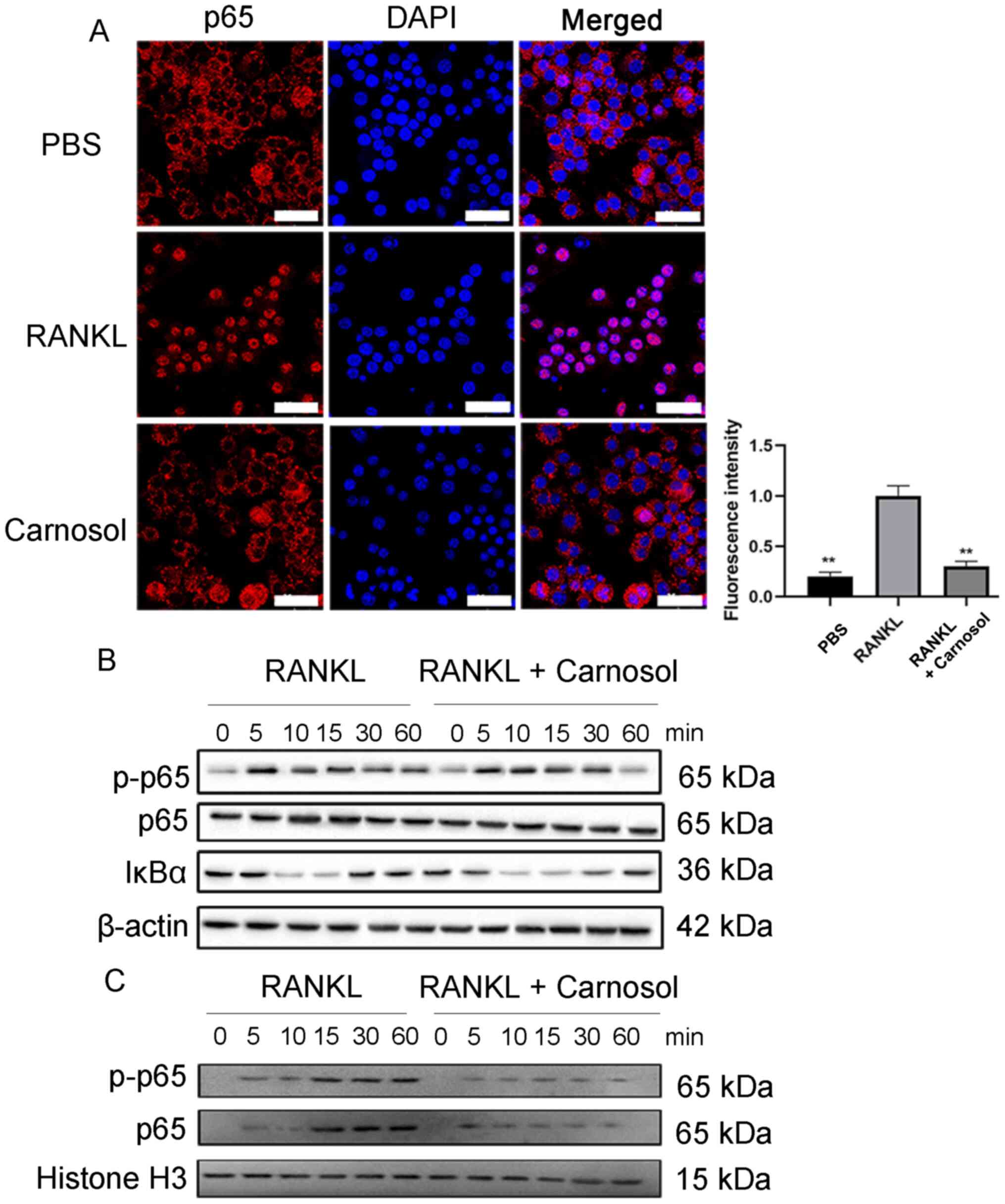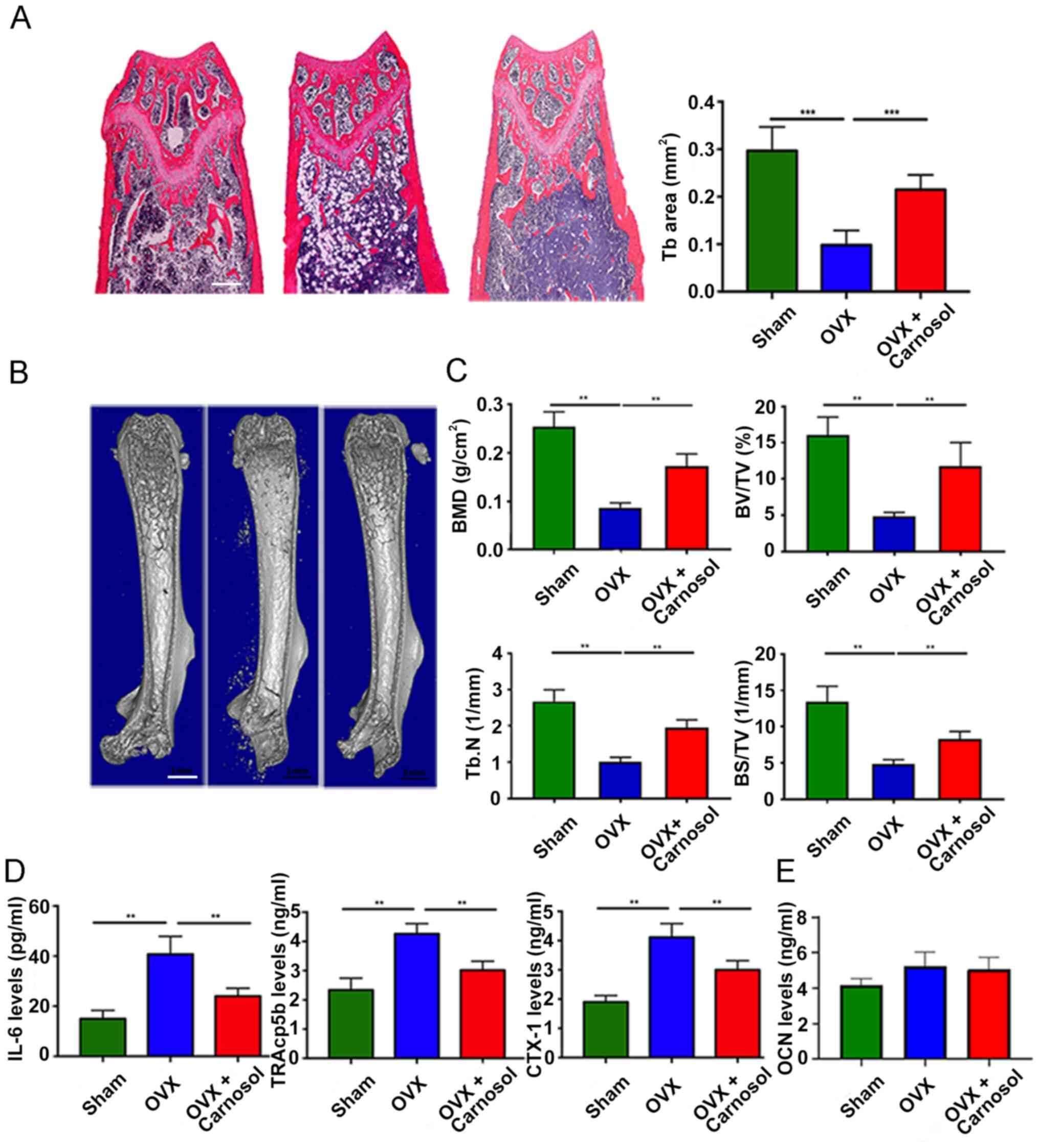|
1
|
Yavropoulou MP and Yovos J:
Osteoclastogenesis-current knowledge and future perspectives. J
Musculoskelet Neuronal Interact. 8:204–216. 2008.PubMed/NCBI
|
|
2
|
Zhan Y, Liang J, Tian K, Che Z, Wang Z,
Yang X, Su Y, Lin X, Song F, Zhao J, et al: Vindoline inhibits
RANKL-induced osteoclastogenesis and prevents ovariectomy-induced
bone loss in mice. Front Pharmacol. 10:15872020. View Article : Google Scholar : PubMed/NCBI
|
|
3
|
Li X, Wang L, Huang B, Gu Y, Luo Y, Zhi X,
Hu Y, Zhang H, Gu Z, Cui J, et al: Targeting actin-bundling protein
L-plastin as an anabolic therapy for bone loss. Sci Adv.
6:eabb71352020. View Article : Google Scholar : PubMed/NCBI
|
|
4
|
Morris JA, Kemp JP, Youlten SE, Laurent L,
Logan JG, Chai RC, Vulpescu NA, Forgetta V, Kleinman A, Mohanty ST,
et al: An atlas of genetic influences on osteoporosis in humans and
mice. Nat Genet. 51:258–266. 2019. View Article : Google Scholar : PubMed/NCBI
|
|
5
|
Majtan T, Hůlková H, Park I, Krijt J,
Kožich V, Bublil EM and Kraus JP: Enzyme replacement prevents
neonatal death, liver damage, and osteoporosis in murine
homocystinuria. FASEB J. 31:5495–5506. 2017. View Article : Google Scholar : PubMed/NCBI
|
|
6
|
Baccaro LF, Conde DM, Costa-Paiva L and
Pinto-Neto AM: The epidemiology and management of postmenopausal
osteoporosis: A viewpoint from Brazil. Clin Interv Aging.
10:583–591. 2015. View Article : Google Scholar : PubMed/NCBI
|
|
7
|
Zhao R: Immune regulation of osteoclast
function in postmenopausal osteoporosis: A critical
interdisciplinary perspective. Int J Med Sci. 9:825–832. 2012.
View Article : Google Scholar : PubMed/NCBI
|
|
8
|
Charatcharoenwitthaya N, Khosla S,
Atkinson EJ, McCready LK and Riggs BL: Effect of blockade of
TNF-alpha and interleukin-1 action on bone resorption in early
postmenopausal women. J Bone Miner Res. 22:724–729. 2007.
View Article : Google Scholar : PubMed/NCBI
|
|
9
|
Silbermann R, Bolzoni M, Storti P, Guasco
D, Bonomini S, Zhou D, Wu J, Anderson JL, Windle JJ, Aversa F, et
al: Bone marrow monocyte-/macrophage-derived activin A mediates the
osteoclastogenic effect of IL-3 in multiple myeloma. Leukemia.
28:951–954. 2014. View Article : Google Scholar : PubMed/NCBI
|
|
10
|
Wu M, Chen W, Lu Y, Zhu G, Hao L and Li
YP: Gα13 negatively controls osteoclastogenesis through inhibition
of the Akt-GSK3β-NFATc1 signalling pathway. Nat Commun.
8:137002017. View Article : Google Scholar : PubMed/NCBI
|
|
11
|
Cui Y, Zhao X, Mei L, Pei J, Wang S, Shao
Y, Tao Y, Zhang X and Jiang L: Osteon myospalacem baileyi
attenuates osteoclast differentiation through RANKL induced NFAT
pathways. J Ethnopharmacol. 213:65–71. 2018. View Article : Google Scholar : PubMed/NCBI
|
|
12
|
Liu W, Zhou L, Zhou C, Zhang S, Jing J,
Xie L, Sun N, Duan X, Jing W, Liang X, et al: GDF11 decreases bone
mass by stimulating osteoclastogenesis and inhibiting osteoblast
differentiation. Nat Commun. 7:127942016. View Article : Google Scholar : PubMed/NCBI
|
|
13
|
Paniwnyk L, Cai H, Albu S, Mason TJ and
Cole R: The enhancement and scale up of the extraction of
anti-oxidants from Rosmarinus officinalis using ultrasound.
Ultrason Sonochem. 16:287–292. 2009. View Article : Google Scholar : PubMed/NCBI
|
|
14
|
Petiwala SM and Johnson JJ: Diterpenes
from rosemary (Rosmarinus officinalis): Defining their
potential for anti-cancer activity. Cancer Lett. 367:93–102. 2015.
View Article : Google Scholar : PubMed/NCBI
|
|
15
|
Frankel EN, Huang SW, Aeschbach R and
Prior E: Antioxidant activity of a rosemary extract and its
constituents, carnosic acid, carnosol, and rosmarinic acid, in bulk
oil and oil-in-water emulsion. J Agric Food Chem. 44:131–135. 1996.
View Article : Google Scholar
|
|
16
|
Huang MT, Ho CT, Wang ZY, Ferraro T, Lou
YR, Stauber K, Ma W, Georgiadis C, Laskin JD and Conney AH:
Inhibition of skin tumorigenesis by rosemary and its constituents
carnosol and ursolic acid. Cancer Res. 54:701–708. 1994.PubMed/NCBI
|
|
17
|
Chen X, Zhi X, Pan P, Cui J, Cao L, Weng
W, Zhou Q, Wang L, Zhai X, Zhao Q, et al: Matrine prevents bone
loss in ovariectomized mice by inhibiting RANKL-induced
osteoclastogenesis. FASEB J. 31:4855–4865. 2017. View Article : Google Scholar : PubMed/NCBI
|
|
18
|
Chen X, Zhi X, Cao L, Weng W, Pan P, Hu H,
Liu C, Zhao Q, Zhou Q, Cui J and Su J: Matrine derivate MASM
uncovers a novel function for ribosomal protein S5 in
osteoclastogenesis and postmenopausal osteoporosis. Cell Death Dis.
8:e30372017. View Article : Google Scholar : PubMed/NCBI
|
|
19
|
Chen X, Zhi X, Yin Z, Li X, Qin L, Qiu Z
and Su J: 18β-Glycyrrhetinic acid inhibits osteoclastogenesis in
vivo and in vitro by blocking RANKL-mediated RANK-TRAF6
interactions and NF-κB and MAPK signaling pathways. Front
Pharmacol. 9:6472018. View Article : Google Scholar : PubMed/NCBI
|
|
20
|
Li J, Ayoub A, Xiu Y, Yin X, Sanders JO,
Mesfin A, Xing L, Yao Z and Boyce BF: TGFβ-induced degradation of
TRAF3 in mesenchymal progenitor cells causes age-related
osteoporosis. Nat Commun. 10:27952019. View Article : Google Scholar : PubMed/NCBI
|
|
21
|
Wu X, Li Z, Yang Z, Zheng C, Jing J, Chen
Y, Ye X, Lian X, Qiu W, Yang F, et al: Caffeic acid
3,4-dihydroxy-phenethyl ester suppresses receptor activator of
NF-κB ligand-induced osteoclastogenesis and prevents
ovariectomy-induced bone loss through inhibition of
mitogen-activated protein kinase/activator protein 1 and
Ca2+-nuclear factor of activated T-cells cytoplasmic 1 signaling
pathways. J Bone Miner Res. 27:1298–1308. 2012. View Article : Google Scholar : PubMed/NCBI
|
|
22
|
Li C, Yang Z, Li Z, Ma Y, Zhang L, Zheng
C, Qiu W, Wu X, Wang X, Li H, et al: Maslinic acid suppresses
osteoclastogenesis and prevents ovariectomy-induced bone loss by
regulating RANKL-mediated NF-κB and MAPK signaling pathways. J Bone
Miner Res. 26:644–656. 2011. View Article : Google Scholar : PubMed/NCBI
|
|
23
|
Zhang Y, Xu S, Li K, Tan K, Liang K, Wang
J, Shen J, Zou W, Hu L, Cai D, et al: mTORC1 inhibits NF-κB/NFATc1
signaling and prevents osteoclast precursor differentiation, in
vitro and in mice. J Bone Miner Res. 32:1829–1840. 2017. View Article : Google Scholar : PubMed/NCBI
|
|
24
|
Chen X, Zhi X, Wang J and Su J: RANKL
signaling in bone marrow mesenchymal stem cells negatively
regulates osteoblastic bone formation. Bone Res. 6:342018.
View Article : Google Scholar : PubMed/NCBI
|
|
25
|
Nakagawa S, Hillebrand GG and Nunez G:
Rosmarinus officinalis L. (Rosemary) extracts containing
carnosic acid and carnosol are potent quorum sensing inhibitors of
staphylococcus aureus virulence. Antibiotics (Basel). 9:1492020.
View Article : Google Scholar : PubMed/NCBI
|
|
26
|
Chen XL, Luo QY, Hu WY, Chen JJ and Zhang
RP: Abietane diterpenoids with antioxidative damage activity from
Rosmarinus officinalis. J Agric Food Chem. 68:5631–5640.
2020. View Article : Google Scholar : PubMed/NCBI
|
|
27
|
Alsamri H, El Hasasna H, Al Dhaheri Y, Eid
AH, Attoub S and Iratni R: Carnosol, a natural polyphenol, inhibits
migration, metastasis and tumor growth of breast cancer via a
ROS-dependent proteasome degradation of STAT3. Front Oncol.
9:7432019. View Article : Google Scholar : PubMed/NCBI
|
|
28
|
Shi W, Xu G, Zhan X, Gao Y, Wang Z, Fu S,
Qin N, Hou X, Ai Y, Wang C, et al: Carnosol inhibits inflammasome
activation by directly targeting HSP90 to treat
inflammasome-mediated diseases. Cell Death Dis. 11:2522020.
View Article : Google Scholar : PubMed/NCBI
|
|
29
|
Sims NA and Martin TJ: Osteoclasts provide
coupling signals to osteoblast lineage cells through multiple
mechanisms. Annu Rev Physiol. 82:507–529. 2020. View Article : Google Scholar : PubMed/NCBI
|
|
30
|
Zhong Z, Qian Z, Zhang X, Chen F, Ni S,
Kang Z, Zhang F, Li D and Yu B: Tetrandrine prevents bone loss in
ovariectomized mice by inhibiting RANKL-induced osteoclastogenesis.
Front Pharmacol. 10:15302020. View Article : Google Scholar : PubMed/NCBI
|
|
31
|
Zhu L, Tang Y, Li XY, Keller ET, Yang J,
Cho JS, Feinberg TY and Weiss SJ: Osteoclast-mediated bone
resorption is controlled by a compensatory network of secreted and
membrane-tethered metalloproteinases. Sci Transl Med.
12:eaaw61432020. View Article : Google Scholar : PubMed/NCBI
|
|
32
|
Cheng C, Wentworth K and Shoback DM: New
frontiers in osteoporosis therapy. Annu Rev Med. 71:277–288. 2020.
View Article : Google Scholar : PubMed/NCBI
|
|
33
|
De Martinis M, Sirufo MM and Ginaldi L:
Osteoporosis: Current and emerging therapies targeted to
immunological checkpoints. Curr Med Chem. 27:6356–6372. 2020.
View Article : Google Scholar : PubMed/NCBI
|
|
34
|
Capozzi A, Lello S and Pontecorvi A: The
inhibition of RANK-ligand in the management of postmenopausal
osteoporosis and related fractures: The role of denosumab. Gynecol
Endocrinol. 30:403–408. 2014. View Article : Google Scholar : PubMed/NCBI
|
|
35
|
Kwon OC, Choi B, Lee EJ, Park JE, Lee EJ,
Kim EY, Kim SM, Shin MK, Kim TH, Hong S, et al: Negative regulation
of osteoclast commitment by intracellular protein phosphatase
magnesium-dependent 1A. Arthritis Rheumatol. 72:750–760. 2020.
View Article : Google Scholar : PubMed/NCBI
|















